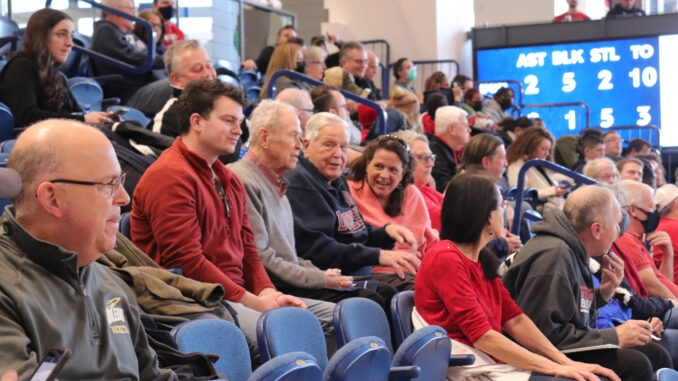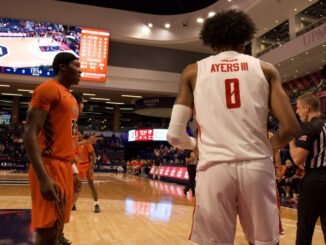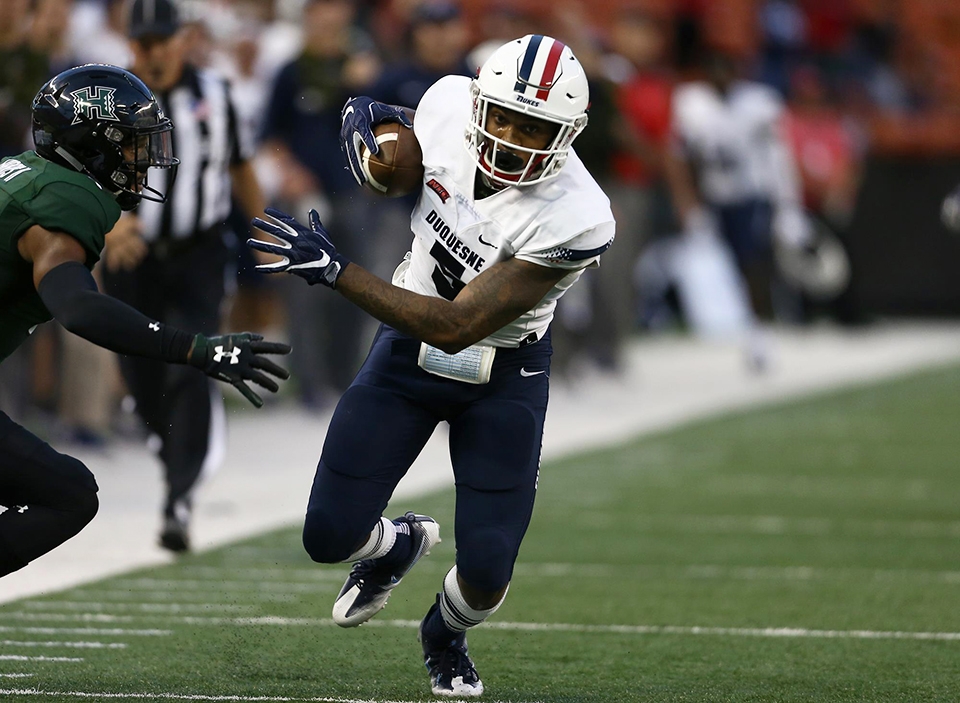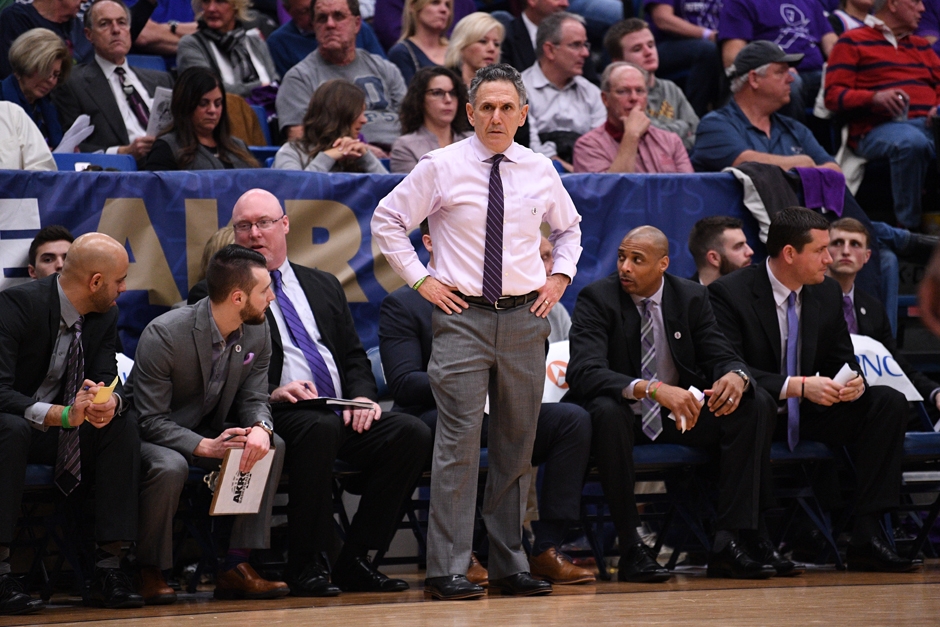
Luke Henne | Sports Editor
Feb. 3, 2022
At 94 years of age, Duquesne alumnus Jack Eckenrode finally returned to campus to watch his alma mater play in the refurbished UPMC Cooper Fieldhouse.
Despite graduating over 70 years ago, Eckenrode never made it a priority to come back and watch the men’s basketball team.
That is until this past Saturday, when he attended the Dukes’ game against Saint Louis with his daughter, Susan Rendulic, and a lifelong friend, Chal McCombs.
What he saw when entering and walking around the fieldhouse put him in awe.
“I’m amazed with what I’m seeing,” Eckenrode said. “We didn’t have anything like this. Nothing like this. I think a lot of people will come here to watch Duquesne.”
Eckenrode’s return was delayed by two weeks. His plan to return for the Jan. 15 game against Dayton was halted after Eckenrode tested positive for Covid-19.
He was alarmed by the diagnosis, but persevered, nonetheless.
“Everything’s fine, and my energy level is back,” Eckenrode said. “The whole week [following the diagnosis], I didn’t have any energy. I had my three shots and everything. I don’t even know how I got it. But I got it.”
After studying at Duquesne from 1946 to 1950 and graduating with a degree in business administration, he enlisted in the Air Force, where he served as a pilot for five years before returning to Pittsburgh.
He’s spent his entire life in the South Hills region of Pittsburgh.
Rendulic, one of Eckenrode’s 12 children, is grateful for the chance to spend moments like Saturday’s game with her father.
“It’s awesome. I’m very lucky,” Rendulic said. “Very lucky to have him here. And he’s still healthy [enough] to have fun.”
Perhaps having 12 children is one reason why Eckenrode never had a chance to return to the Bluff.
“I was a family man,” Eckenrode said, laughing. “I didn’t have much time.”
Eckenrode and McCombs both graduated from Mt. Lebanon High School, where their friendship blossomed. Both stayed close to home as college came around, with McCombs deciding to attend the University of Pittsburgh.
With both of them now over the age of 90, Eckenrode cherishes their long-standing friendship more each and every day.
What are the keys to maintaining good health for such an extended period of time? According to Eckenrode, there are a few prime reasons.
“We behaved ourselves,” Eckenrode said, laughing. “We didn’t smoke and drink.”
During his college years, Eckenrode got the opportunity to watch Chuck Cooper, who became the first African American drafted into the National Basketball Association, play during his collegiate career at Duquesne. Cooper’s time with the Dukes spanned the entire length of Eckenrode’s college tenure.
Cooper, whose legacy is now preserved within the arena’s name, left a palpable impact on the relationship between integration and professional sports.
For Eckenrode, however, he couldn’t foresee that history coming. He just enjoyed watching Cooper play basketball.
“I knew he was a good player, and we enjoyed watching him, but that part of it never entered my mind,” Eckenrode said.
The way of life in Eckenrode’s time in college drastically differs from the present landscape.
“We did commute, back and forth, from the South Hills,” Eckenrode said. “Many, many times, we didn’t have much money in our pockets, so what’d we do? We hitchhiked right here at the Liberty Bridge. And they took us home. If you had books, everybody picked you up.
“We wouldn’t sit there [for] one minute. They saw the books, they picked you up and took you up to Dormont or Mount Lebanon. Dropped you off. You walked home.”
Just as the lifestyle has changed, so has the cost of attending college.
“They didn’t have school loans yet,” Eckenrode said. “You could have a summer job and afford it [college].”
Having a friendship that saw one member hailed from Pitt and the other Duquesne reignited the debate surrounding whether the two programs should play one another on an annual basis.
Eckenrode and McCombs are advocates of the idea, ultimately hoping that all of the region’s big-name programs, including schools like West Virginia and Penn State, can find a way to schedule one another in the future.
“It would draw. They should do it. I miss it,” Eckenrode said. “It’s the same with WVU. They should play Pitt. It doesn’t have to be football, but basketball, they could fit that in.
“And Duquesne could play WVU. I know they may not do real good, but still, it would draw.”
As a fan of a Duquesne program that’s been starved of postseason recognition and national prominence for so long, Eckenrode hopes he can witness that return to glory and national respect.
It doesn’t matter whether that comes in the form of a bid to the NCAA Tournament (the Dukes last appeared in the event in 1977) or the National Invitation Tournament (the Dukes won the event in 1955 and last appeared in the event in 2009).
“I would love to see that. I don’t know why they don’t recruit a little better so they can go [to a postseason tournament],” Eckenrode said. “The NIT, we looked forward to that every year. It was nice. It was a big deal to go to the NIT.”
Eckenrode, who was a member of the Gamma Phi fraternity, reminisced about the memories he made during his active involvement.
“I used to get tickets for my buddies from Pitt and Carnegie Mellon and W&J [Washington & Jefferson], and they’d give me tickets so that I could go to their events,” Eckenrode said.
Before sitting back to watch his first game at the fieldhouse, Eckenrode offered a piece of advice to students, both present and future, in order to help them make the most of their tenure at Duquesne.
“I would tell them to do what I did,” Eckenrode said. “The fraternity was very active in activities within the school, like dances and things like that.
“If you’re not doing that [regularly getting involved in on-campus student organizations], you’re missing out on a lot of good activities.”




